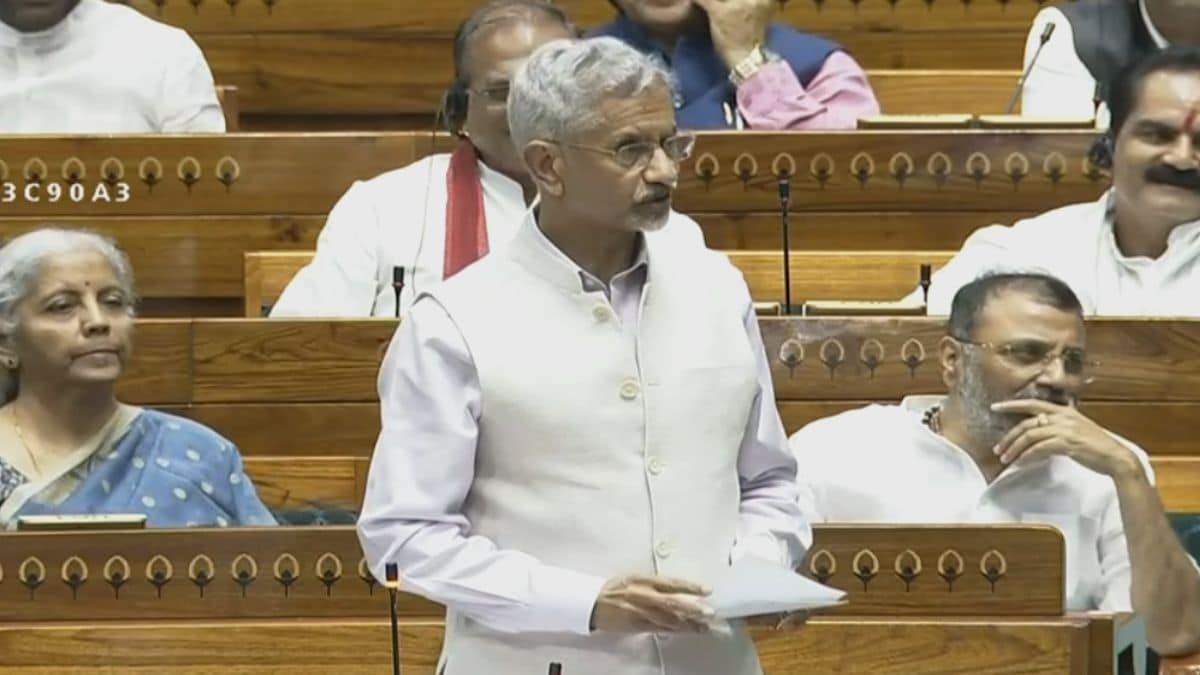India's EAM Jaishankar Dismisses Trump Trade Link Claim; Says Pakistan Requested Ceasefire, Global Support Backed Operation Sindoor
India’s External Affairs Minister S. Jaishankar on Monday firmly denied any connection between U.S. trade talks and Operation Sindoor; stated that the request to halt military action came from Pakistan through official military channels; highlighted near-universal global backing for India’s response to the Pahalgam terror attack; and confirmed new diplomatic and strategic measures against Pakistan including a freeze on the Indus Waters Treaty.
Addressing the Lok Sabha during a special discussion on India's military response, Jaishankar asserted that there was no linkage at any point between Operation Sindoor and trade negotiations with the United States.
 |
| Image Source: LS Secretariat |
“At no stage in any conversation with the U.S. was there any linkage with trade and what was going on,” Jaishankar said.
He also clarified that there were no calls between Prime Minister Modi and President Trump between April 22 and June 17, rejecting suggestions of coordinated U.S. intervention during the military operations.
Jaishankar explained that the actual request to cease hostilities came from Pakistan, transmitted formally through the Directors General of Military Operations (DGMO) channel.
“On May 10, we received impressions that Pakistan wanted to end the fighting. We said that such a request must come through the DGMO channel—and that is exactly how it came,” he said.
Refuting Trump’s public assertion—repeated 26 times—that he personally brokered peace via trade threats, the minister pointed to a deliberate and direct diplomatic pathway driven by India.
He emphasised that India initiated Operation Sindoor on May 7 in response to the Pahalgam terror attack, which killed 26 civilians, and concluded its objectives before any formal communication about ceasefire was received.
Jaishankar also highlighted the strength of India’s international diplomacy, revealing that only three of 190 United Nations member states opposed Operation Sindoor.
“The overwhelming global consensus was clear—terrorism is unacceptable, and a nation under attack has the right to defend itself,” he said.
He credited India's diplomatic groundwork in securing global support, stating, “What we tried to create was a narrative to prepare the diplomacy for the launch of Operation Sindoor.”
According to the minister, the military strikes were precise, measured, and non-escalatory, targeting terror infrastructure in Pakistan and Pakistan-occupied Kashmir.
He reiterated that India's actions were focused on accountability for the Pahalgam attack, not escalation. The U.S. designation of The Resistance Front (TRF) as a global terrorist organisation, Jaishankar said, was a direct result of India’s outreach.
In a significant foreign policy move, Jaishankar disclosed that India’s Cabinet Committee on Security decided to suspend the Indus Waters Treaty until Pakistan ends its support for cross-border terrorism.
“It was very clear that our response would not end with military action alone. We had to shape global understanding of Pakistan’s role,” he said.
The external affairs minister also pointed out that India’s diplomatic efforts aimed to expose Pakistan’s long-standing state sponsorship of terrorism and highlight the Pahalgam attack as an effort to disrupt Kashmir’s economy and stoke communal tensions.
“Our message was consistent--zero tolerance for terrorism and the sovereign right to defend our people,” Jaishankar said.
His remarks came in response to Congress leader Gaurav Gogoi, who criticised the government over Trump’s repeated statements linking trade and ceasefire. Gogoi and other opposition members have used the U.S. president’s claims to question the government’s narrative around Operation Sindoor and its diplomatic autonomy.
India and Pakistan reached an understanding to end hostilities on May 10 after four days of drone and missile exchanges.
India has maintained that it initiated and concluded its military action independently, and that Islamabad initiated the ceasefire request under pressure.
The debate comes amid heightened public scrutiny of India's national security doctrine and foreign policy clarity following the Pahalgam attack.
Jaishankar’s intervention sought to underline a unified diplomatic and military front that, according to the government, successfully isolated Pakistan on the world stage while responding decisively to terror.
Also Read:
The Litmus Test of Bharatiyata: Indian Parliament Gathers in the Shadow of Pahalgam
